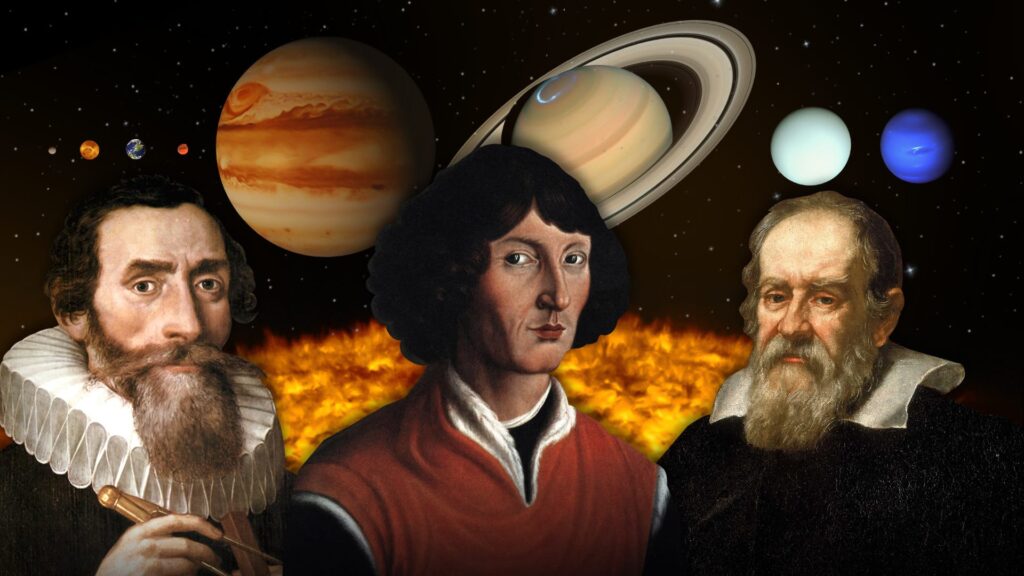Five big names in astronomy who’ve helped us learn a ton about space are Nicolaus Copernicus, Galileo Galilei, Johannes Kepler, Isaac Newton, and Edwin Hubble. Copernicus said the Sun’s in the middle of our solar system.
Galileo improved the telescope and found cool stuff in space. Kepler figured out how planets move around the Sun. Newton made up the laws of gravity, which changed how we think about space.
Hubble saw galaxies moving apart, showing us the universe is getting bigger. These astronomers totally rocked the world of astronomy and still inspire us today!
In this article, we’ll check out the stories and discoveries of five awesome astronomers who’ve really helped us figure out the universe.
1. Nicolaus Copernicus
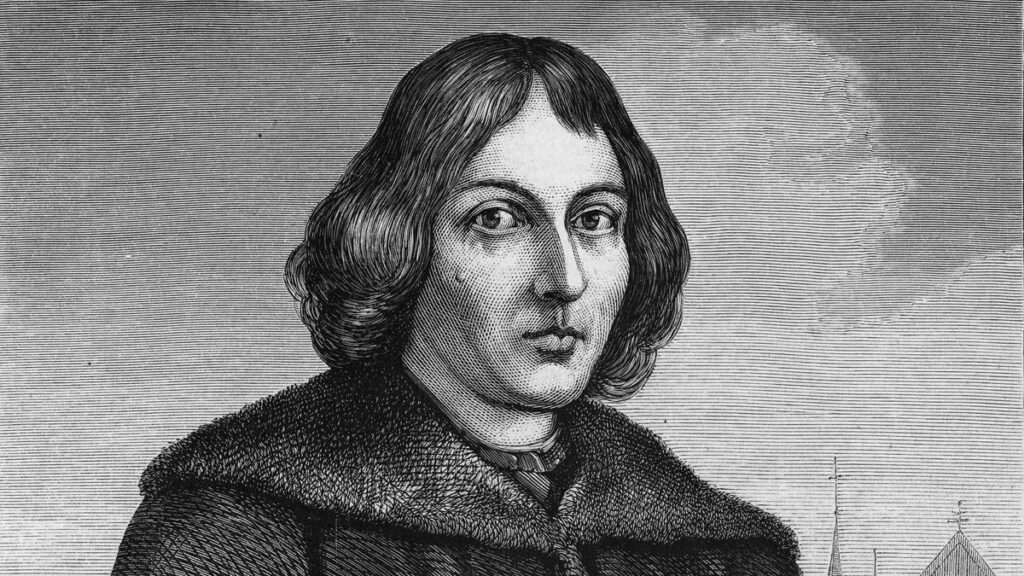
Nicolaus Copernicus was born on February 19, 1473, in Thorn, a city in the Kingdom of Poland (present-day Toruń, Poland).
He came from a well-educated family and displayed an early interest in mathematics and astronomy. Copernicus studied at various universities across Europe, including the University of Krakow and the University of Bologna, where he developed a strong foundation in mathematics and astronomy. He later earned a doctorate in canon law from the University of Ferrara.
Throughout his life, Copernicus held various positions, including physician, economist, diplomat, and church administrator.
However, his true passion lay in astronomy, and he dedicated much of his time to studying the heavens and developing his revolutionary cosmological model.
Contributions to Astronomy
Copernicus’s most significant contribution to astronomy was his development of the heliocentric model of the solar system. In his seminal work, “De Revolutionibus Orbium Coelestium” (On the Revolutions of the Celestial Spheres), published in 1543, Copernicus proposed that the Earth orbits the Sun, challenging the prevailing geocentric model, which placed Earth at the center of the universe.
According to Copernicus’s heliocentric model, the apparent daily motion of the stars is due to the Earth’s rotation on its axis, while the annual motion of the planets is a result of their orbits around the Sun.
Copernicus’s heliocentric model revolutionized our understanding of the cosmos, laying the groundwork for modern astronomy and cosmology.
His model provided a more accurate explanation of the observed motions of the planets and stars and resolved several inconsistencies in the geocentric model, such as the retrograde motion of the planets.
Legacy and Impact
Copernicus shook up the world with his idea that the Sun, not the Earth, sits at the center of our solar system. This concept challenged old ways of thinking and kick-started the Scientific Revolution. His thinking influenced other famous astronomers like Galileo and Kepler, who built on his ideas and made them even better.
Even though some folks didn’t like Copernicus’s ideas at first, his heliocentric model eventually caught on and became the basis of modern astronomy. His bold thinking continues to inspire people to question what they know and explore the universe.
Copernicus’s legacy reminds us to always seek the truth and keep asking big questions about the cosmos. He’s a reminder of the incredible things human curiosity can achieve!
2. Galileo Galilei
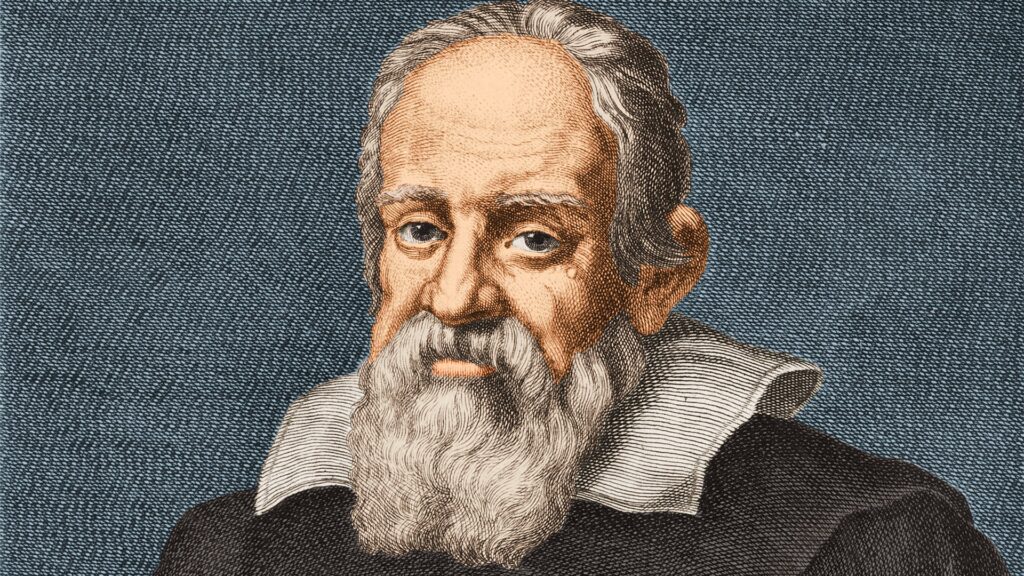
Galileo Galilei, born on February 15, 1564, in Pisa, Italy, was a pioneering Italian astronomer, physicist, and mathematician. He was the eldest of six children born to Vincenzo Galilei, a renowned musician, and Giulia Ammannati. Galileo received his early education at a Jesuit monastery, where he excelled in mathematics and natural philosophy.
In 1581, Galileo enrolled at the University of Pisa to study medicine, following his father’s wishes.
However, he soon became fascinated with mathematics and physics, and he began conducting experiments and observations in astronomy.
Despite facing financial difficulties, Galileo continued his studies and eventually became a professor of mathematics at the University of Pisa.
Throughout his life, Galileo faced challenges and controversies due to his outspoken views and unorthodox methods.
However, his relentless pursuit of truth and commitment to scientific inquiry propelled him to become one of the most influential figures in the history of science.
Contributions to Astronomy
Galileo totally changed our view of the universe with his groundbreaking discoveries. Here are some of the coolest things he did
Galileo pointed his telescope at the Moon and saw mountains, valleys, and craters, proving it’s not the perfect ball of light people thought it was. This rocked the idea that celestial bodies never change.
In 1610, he spotted four moons hanging out around Jupiter. This was huge because it showed that not everything orbits Earth—it was the first time we realized moons could orbit other planets.
Galileo saw Venus going through phases, just like the Moon does. This was more evidence that the Sun, not Earth, is the center of our solar system.
He also noticed dark spots on the Sun’s surface called sunspots, proving that the Sun isn’t always the same and has its own activity.
Legacy and Impact
Galileo’s impact on science was huge! His discoveries challenged the old idea that Earth was at the center of everything and showed that the Sun was really the star of the show, just like Copernicus said. By using his telescope to peek at the sky, he opened up a whole new world of observation, setting the stage for future discoveries.
Even though he got in trouble with the Catholic Church for his ideas, Galileo’s thinking eventually won out. His focus on using evidence and math to understand the universe laid the foundation for modern science. Plus, his fight for free thinking still inspires people today.
Galileo’s legacy reminds us to keep asking questions and seeking truth. He’s a true hero of science whose impact will be felt for ages to come.
3. Johannes Kepler
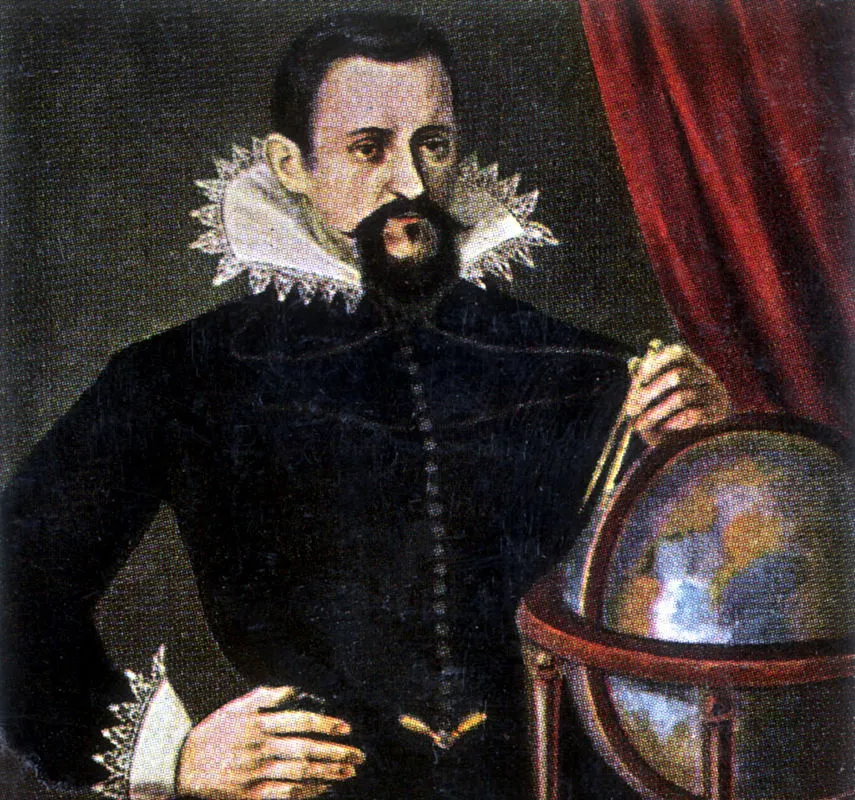
Johannes Kepler was born on December 27, 1571, in Weil der Stadt, in the Holy Roman Empire (present-day Germany). He was the son of Heinrich Kepler, a mercenary, and Katharina Guldenmann.
Kepler’s early years were marked by adversity and hardship, including the death of his father when he was young and financial struggles that forced him to leave school temporarily.
Despite these challenges, Kepler displayed exceptional talent in mathematics and astronomy from a young age. He attended the University of Tübingen, where he studied theology, philosophy, and mathematics.
Kepler was deeply influenced by the work of astronomers such as Nicolaus Copernicus and Tycho Brahe, whose observations of the heavens inspired him to pursue a career in astronomy.
After completing his studies, Kepler began on a prolific career as an astronomer, mathematician, and astrologer. He held various positions throughout his life, including serving as the imperial mathematician to Emperor Rudolf II in Prague. Kepler’s life was marked by intellectual curiosity, scientific inquiry, and a relentless quest to unlock the secrets of the cosmos.
Contributions to Astronomy
Johannes Kepler rocked the world of astronomy with his awesome discoveries. Here are some of the coolest things he did
He came up with three laws that explain how planets move around the Sun. First, he said planets follow oval paths, not perfect circles, with the Sun off to one side.
Then, he showed that planets move faster when they’re closer to the Sun and slower when they’re farther away. Finally, he figured out a cool math trick that links a planet’s distance from the Sun to how long it takes to go around.
Kepler’s laws explained puzzling stuff about how planets move, finally matching up with what people were seeing in the sky. This helped pave the way for Isaac Newton’s later work on gravity and motion.
Kepler made super accurate tables called the Rudolphine Tables that predicted where stars, planets, and comets would be in the sky. These tables were a big deal for navigation and keeping track of time back in the day.
Legacy and Impact
Johannes Kepler left an incredible mark on the world of science. His laws of planetary motion changed how we understand how planets move around the Sun, giving us a solid math-based way to describe it all.
Kepler’s focus on using evidence, math, and careful investigation set a high bar for how science should be done. His work didn’t just influence his own time—it helped spark a whole scientific revolution and shaped how we see the universe today.
Beyond his scientific achievements, Kepler’s ideas also challenged old ways of thinking and pushed society to embrace new perspectives. He played a huge role in shifting our view of the cosmos from Earth-centered to Sun-centered.
4. Isaac Newton
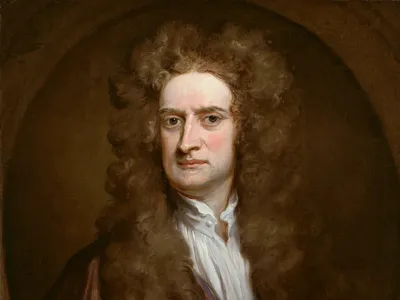
Isaac Newton was born on January 4, 1643, in Woolsthorpe, Lincolnshire, England. He was born prematurely and was not expected to survive, but he grew up to become one of the most influential scientists in history. Newton’s early life was marked by hardship and adversity, as he was orphaned at a young age and raised by his grandmother.
Despite his humble beginnings, Newton showed remarkable aptitude for mathematics and science from a young age. He attended the King’s School in Grantham and later enrolled at Trinity College, Cambridge, where he studied mathematics and natural philosophy.
Newton’s brilliance soon became apparent, and he made significant contributions to mathematics and physics during his time at Cambridge.
After completing his studies, Newton returned to Cambridge as a professor of mathematics, where he continued his research and made groundbreaking discoveries in various fields of science. His work laid the foundation for modern physics and revolutionized our understanding of the natural world.
Contributions to Astronomy
Isaac Newton was a total genius when it came to understanding how things move in space.
Newton figured out that every single thing in the universe pulls on every other thing with a force that depends on how big they are and how far apart they are. This explained why planets orbit the Sun and why apples fall to the ground—it’s all because of gravity!
He came up with three rules that explain how objects move when forces act on them. These laws are like the rulebook for how stuff moves around in space.
Newton invented a new kind of telescope called the reflecting telescope. Instead of using lenses like regular telescopes, his design used mirrors to see faraway things more clearly. This changed how astronomers explored the cosmos, giving them a clearer view of distant objects.
Legacy and Impact
Isaac Newton was a giant in the world of science, and his impact is still felt today. His laws of motion and gravity laid the foundation for understanding how things move in the universe, shaping modern physics as we know it.
Newton’s work didn’t just stay in the lab—it changed the way we see the world. His inventions, like the reflecting telescope, are still used today, and his ideas are taught in classrooms everywhere.
But Newton’s influence goes beyond science. He was a key figure in the Enlightenment, a time when people started valuing reason and evidence over tradition and superstition. His emphasis on using observation and math to understand the world helped kick-start a new era of exploration and discovery.
Newton’s legacy is one of curiosity, innovation, and a relentless pursuit of truth. He’s a true icon whose ideas continue to shape our understanding of the universe and our place in it.
5. Edwin Hubble
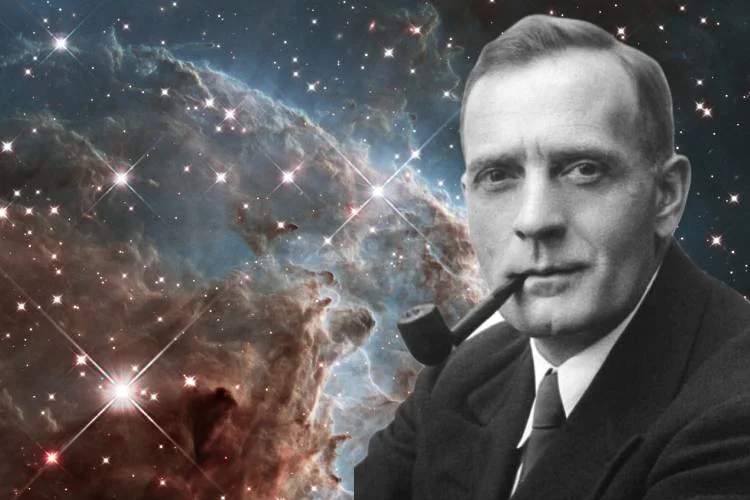
Edwin Hubble was born on November 20, 1889, in Marshfield, Missouri, USA. He showed an early interest in science and astronomy, studying mathematics and astronomy at the University of Chicago.
After completing his undergraduate studies, Hubble attended Oxford University as a Rhodes Scholar, where he earned his master’s degree in jurisprudence. However, his passion for astronomy led him to pursue a career in science instead of law.
In 1919, Hubble joined the staff of the Mount Wilson Observatory in California, where he conducted pioneering research in observational astronomy. Using the observatory’s powerful telescopes, Hubble made groundbreaking discoveries that revolutionized our understanding of the universe.
Contributions to Astronomy
Edwin Hubble was a game-changer in astronomy, and here’s why
He blew everyone’s minds by proving that those blurry patches of light we thought were part of our own Milky Way were actually separate galaxies, way far away. This discovery totally reshaped our view of the universe, showing it’s way bigger and more varied than we thought.
Hubble also figured out that galaxies are flying away from us, and the farther they are, the faster they’re zooming off. This idea, called Hubble’s Law, was a huge clue that the universe is expanding, setting the stage for the Big Bang theory.
Hubble came up with a way to sort galaxies into groups based on their shapes, like spirals, blobs, and wonky ones. This system helps astronomers understand how galaxies form and change over time.
Legacy and Impact
Edwin Hubble’s impact on astronomy was enormous, shaping our understanding of the universe in profound ways. His discoveries turned cosmology into a serious science and laid the foundation for modern astronomy.
By revealing galaxies beyond our own, Hubble opened our eyes to the vastness of space and the incredible variety of celestial objects out there. His observation of an expanding universe provided crucial evidence for the Big Bang theory, changing how we think about the universe’s beginnings.
Hubble’s legacy lives on through the Hubble Space Telescope, which continues to give us breathtaking views of the cosmos. His work inspires astronomers to keep exploring and unraveling the mysteries of space.
Hubble’s contributions are a testament to human curiosity and our ability to uncover the secrets of the universe. He’s a true hero of astronomy whose impact will be felt for generations to come.
FAQ
Who is the father of astronomy?
The father of astronomy is often credited to be Nicolaus Copernicus, whose heliocentric model revolutionized our understanding of the solar system.
What are 5 things astronomers study?
Astronomers study celestial objects such as stars, planets, galaxies, and nebulae, as well as phenomena like black holes, supernovae, and cosmic radiation.
Who is the first female astronomer?
The first female astronomer is often attributed to Hypatia of Alexandria, a Greek mathematician, astronomer, and philosopher who lived in the 4th century AD.
Who is the mother of astronomy?
The title of “mother of astronomy” is sometimes given to Caroline Herschel, a pioneering astronomer known for her discoveries of comets and her extensive cataloging work.
Who is the king of astronomy?
There is no single “king of astronomy,” as the field is collaborative and diverse, with many notable astronomers contributing to its advancement throughout history. However, individuals like Galileo Galilei, Johannes Kepler, and Edwin Hubble are often regarded as giants in the field.
Final thoughts
Nicolaus Copernicus, Galileo Galilei, Johannes Kepler, Isaac Newton, and Edwin Hubble are a stellar team of astronomers who’ve totally changed how we see the universe. From Copernicus’s bold idea that the Sun, not Earth, is at the center of our solar system, to Hubble’s mind-blowing discovery that the universe is expanding, their findings have rocked the world of astronomy.
